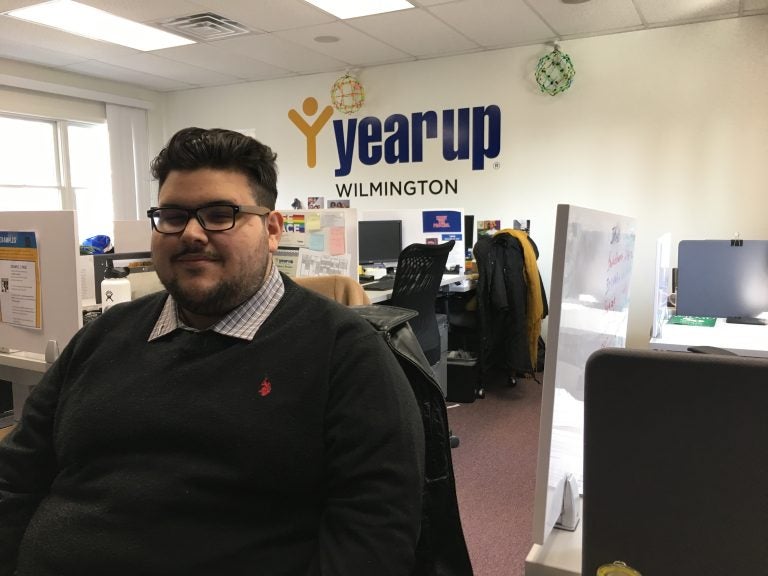Year Up job-training program helps students find success
Year Up has helped thousands of students get job training and find work, but the organization is having some trouble convincing potential participants that it's not a scam.
Listen 2:46
Zach Rivera is halfway through the Year Up job-training program at Wilmington University. (Mark Eichmann/WHYY)
Year Up has helped thousands of students get job training and find work with top employers — but the organization is having some trouble convincing potential participants that it’s not a scam.
“It sounds way too good to be true,” said Zach Rivera, a current Year Up student from Newark, Delaware. “It’s free, you get paid off of it … nobody would believe that that’s possible.”
Rivera is one of 125 students enrolled in Year Up at the Wilmington University campus in New Castle. The program has another 355 participants at Peirce College in Philadelphia. In addition to six months of IT or business coursework at either Wilmington University or Peirce, students spend another six months working at paid internships at a major employer such as JP Morgan Chase.
The program is free to participants, thanks to corporate sponsorships. But, because of that, organizers have to do some work to convince potential students that they’re not going to be swindled in some way. A survey of Year Up students found that 37 percent were concerned about the program before signing up, with the top worry that Year Up “could be a scam.”
It’s an understandable concern, said Hassan Charles, Year Up’s executive director for the greater Philadelphia region, which includes Wilmington.
“They don’t necessarily believe that all these resources and supports are available to them free of charge,” he said. “It’s been a rare occasion for them that they’ve had that kind of support.”
That support system provides a safety net that some of these students never had before, which leads to some mistrust of Year Up’s motivation.
“Change only happens at the speed of trust. It really is important that we build those relationships in the right way, so that when we encounter those barriers and issues, we will be recognized as a resource that will really help those young adults move to the next level,” Charles said.
Jaqui Fletcher, a recent graduate of the Year Up program, was hired by JP Morgan Chase following his internship. One of the main things he learned through the program is perseverance.
“It taught me how to grind … one thing that Year Up is big on is grit. I think that’s another skill that I’ve gained here,” Fletcher said.
That focus on grit is by design.
“It’s not easy. This isn’t a handout, it’s a hand up. We don’t do the work for the students,” Charles said. “The professional skills training that our students receive is pretty much the ‘secret sauce’ of what we do … So it’s every bit as important that they learn how to take and give feedback, as it is how to write a business memorandum.”
Year Up’s mission is to eliminate the “opportunity divide.”
“There are millions of young adults across the country who are facing social and economic injustice, and despite having the talent and motivation, they just lack access,” Charles said. “At the same time, our economy needs help, there are businesses all across the country who are calling for more and better-trained talent to be able to compete on a global stage, but there aren’t enough skilled workers.”
For Rivera, his intensive time in Year Up is worth the opportunities that will open up once he’s finished.
“It’s only a year, you have that year to work hard, and that’s going to step you into a job that you never thought you would have had for the rest of your life,” he said. “It’s crazy.”
Since its inception 18 years ago, Year Up has helped more than 20,000 students nationwide. This year, 4,000 interns took part in the program around the country, 480 in the region.
Out of those students who complete the program, more than 80 percent are successfully placed in jobs with an average salary of $38,000.
“If there’s any opportunity to break the cycle of poverty in a family or a community in the span of a year, I’m going to take it,” Charles said.
Interns are accepted twice a year, in January/February and July/August.
WHYY is your source for fact-based, in-depth journalism and information. As a nonprofit organization, we rely on financial support from readers like you. Please give today.





